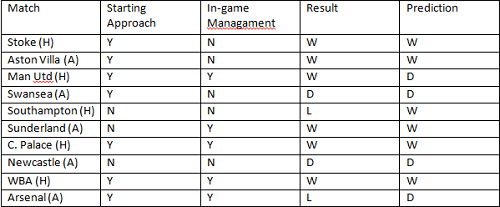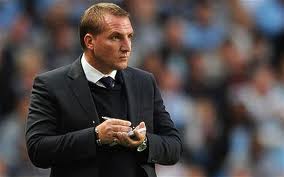By Mihail Vladimirov.
The first ten league games are over, so it’s time for me to share my thoughts on how the team has fared based on the simple points model I created in the summer of 2012.
First of all, there is a sort of dilemma currently in my head. On one hand I voted in the poll that the team will finish sixth with 63-68pts this season. This is based on the fact I’m yet to be convinced of Rodgers’ tactical management and that he would be able to squeeze every last drop out of the current squad’s tactical potential in order to mount a serious Top 4 assault.
Meanwhile, however, I’m of the opinion that this squad is Top 4 material in terms of tactical potential. Meaning I really believe the team could at the very least challenge hard for that coveted fourth place.
Based on this I’ve been thinking how exactly to benchmark the team’s results this season. But given my strong feelings I decided I’d use the benchmark of 75pts, which at the very least would deliver that Top 4 push. So here are the results, what my model predicted and some additional tactical benchmarks:
Points predicted = 22; points delivered = 20. So, no complaints on that front at all.
I’ve specifically included the graphs ‘starting approach’ and ‘in-game management’ as these two, in very simple terms, display how the team has fared tactically in each game. I use these two metrics to decide whether the team was tactically suitable and whether the team deserved the result. For example, the first two games should have been draws, based on the team only faring well tactically in terms of starting approach, but doing poorer as the game progressed. The Man Utd, Palace and WBA games showed the team as being tactically as faultless as it could’ve been, which resulted in three wins. The Southampton game showed that tactically Liverpool deserved to lose, and they did. The Newcastle game showed another ‘no-no’ game, which lead to the team deservedly failing to win it (against 10 men for half the game). But the Arsenal game showed the other side – that the team was really ‘tactically unlucky’ to lose it.
In summary Liverpool have more points than their tactical suitability and efficiency would indicate the team has deserved – the team gained 20, while based on the tactical benchmarks the total should have been 17 (including a win against Arsenal). To put it shortly, a team would be lucky to win a game when either or both of the starting approach and the in-game management was flawed; while being unlucky not to win a game when both aspects seemed spot-on.
I know there is a saying that a manager should be judged based on the results. As much as I think this has some merit, I strongly believe this is a deeply flawed strategy. Why? Because to me the results are the least thing the manager has a direct influence on. For example, a manager and his players could do everything brilliantly (in terms of fitness, tactical and motivational preparation leading to a superb performance on the pitch), only for the opposition to nick a goal and draw or even win the game. There are many things (including the referee, the opposition and the ball) that a manager can’t control – but they are all things that directly, and most importantly – vitally- can influence the game’s outcome. How many times did we see Liverpool (or any other team for that matter) completely battering the opposition only to lose/draw a game? Of course, this could work the other way around – the team could perform really poorly but still gain a point or three.
My thinking is that the result is not the perfect evidence of how well or poorly a team has been playing, or the players and the manager have been doing in a game, or over the whole season. Sure, if you do consistently well, you’d expect in the long term your results to match your performances.
And this is the key – to understand that it’s the performances that lead to more wins over the long-term. Play well and you could still lose or draw few games. But over the season you’d win more games than you’d lose or draw. And vice-versa – play poorly and you will for sure win some games; but over the long-term the results would surely match the performances. Two games quickly spring to mind. The win against Spurs at Anfield last season and the game at The Emirates this season. In the former match, the opposition completely battered Liverpool for the best part of the game, conceding two individual mistakes to gift Liverpool a completely undeserved win. Almost the opposite happened at the Emirates – while Liverpool weren’t brilliant at all, they did enough to warrant at least a draw, if it wasn’t for two situations full of individual errors and some misses at the other end.
All I’m saying here is that for me the performances are the true barometer for how well the manager and the players are doing.
My belief is that a manager can influence his team’s performances more than he can influence the result. Which is the single reason (above all) that indicates to me that this is the true barometer for how well the manager is doing. The scoreline should be seen as a result of the performances, not the other way around. I know this seems really simple and logical – it is! And that’s why I’m baffled by the lazy cliché that says it’s the results that are the only (or main) criteria. This is true in the way that good performances should, over the long-term, lead to good results. But sometimes a manager could get a completely undeserved credit or will be not credited at all simply based on the result; and not the performance.
Following all of this, my thinking is that the most crucial part of how well a team is going to perform is the tactical management of the manager and his staff (pre- and during the game). Motivation and players’ quality also play a pivotal role. The former should always be presentable in that if there is someone who is not motivated to perform he shouldn’t be playing at all. Players’ quality is more tricky in that, surely, the better the players, the more scope the manager would have to formulate decent tactical plans which lead to a good result more often than not. However, my thinking is that over the long-term you’d see tactics compensating for inferior players much more than you’d see superior players consistently compensating for poor tactics. Which is why I value tactics above all (presumably you have a decent squad which is always motivated).
To summarise – to me how well a team is performing is the better way to judge how well, or not, its manager is doing his job. In addition, observing, analysing and judging the manager’s tactical management is key in determining how well his team is performing, or not.
Based on that, I’d say in the first ten league games Rodgers did reasonably well – not poorly, but not superb either (perhaps a 5 or 6 out of 10, if I’m to use a numerical rating). Tactically, he had only two really poor games – Southampton and Newcastle. Not a surprise then than the team deservedly failed to win each of them, and lost the former. On the other hand he had four impeccable games – Man Utd, Palace, WBA and Arsenal. Not a surprise then that the team won three of them and was really unlucky to lose against Arsenal. What has been poor though has been his general inconsistencies. There were four games (Stoke, Villa, Swansea and Sunderland) that he showed either a poor starting set-up (once, v Sunderland) or poor reactions to what was happening in the game (the other three games).
The ‘general inconsistency’ tag comes from how fluctuating the team looked tactically in the first seven games: three of the opening four games saw good initial strategy but poor in-game response (Stoke, Villa, Swansea). The United game was faultless, but mainly based on how poor Moyes’ overall management was in this game. Then came the Sunderland game which showed poor starting set-up but improved behaviour as the game progressed. It was only in the seventh game of the season where the team finally managed to produce an all-round good performance throughout the whole game – and it was against one of the poor teams in the league, who tactically played into Liverpool’s hands. The fifth and eight games (So’ton, Newcastle) saw the team being poor in both tactical metrics. But the ninth and tenth games were the best in the season up to now.
All of this could be easily justified with new players coming in – and yet to be fully gelled within the team – key players missing some games etc. But what disappointed from a tactical point of view was the general inconsistency that Rodgers showed (even in the games when he had most of his squad fully fit). That’s why it will be really fascinating and important to see how well Rodgers does in the next batch of ten league games. I really believe if Rodgers managed to stabilise his own performance in terms of tactical management (meaning have no more than two ‘no-no’ and two ‘yes-no/no-yes’ type of performances, which will leave him with six ‘yes-yes’ displays), the team has enough quality, depth and general tactical flexibility to go on a real Top 4 push.
I know Rodgers is often quoted to believe in the mantra that “if you are better than your opponent with the ball you have a 79% chance of winning the game”. I believe that if you managed to have ‘yes-yes’ tactical performances you are going to win between five and seven (allowing for the other three to be either poor performances or unlucky games when you aren’t going to win) of every ten games (which is around 60% win rate).
To finish off – I’ve always been of the opinion than every new managers deserves three full seasons before being judged whether he deserves a new contract (another year or two); or need to be replaced. Granted, this isn’t the case if the new manager shows quite quickly that he is completely unsuitable for what the club needs and/or want to achieve in his first sixth months or so. To me a logical benchmark to judge these three years is the following:
– First year – prevent looking out of your depth and show enough promise;
– Second year – develop the showed promise into a real progress;
– Third year – use the showed progress to achieve something.
In Liverpool and Rodgers’ case I’d say ‘achieve something’ means a CL qualification. If this happens in season 2 – all the better. But it really needs to happen by the time the third season is over. Anyway, I’d comfortably say Rodgers did the first part quite well. Last season he was similarly inconsistent in terms of his tactical management, and as a result how the team performed. But equally, he showed enough promise to prevent deserving the sack. He is now at the point when he needs to deliver some clear signs of progress – starting by minimising the fluctuating nature of his and his team’s performances.
As I mentioned at the start – based on the current squad, to me that would naturally lead to a real Top 4 challenge (which may or may not finish with a CL qualification – that will depend on how the other teams are going to fare).

